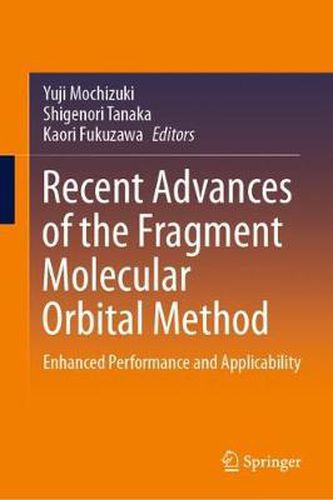Readings Newsletter
Become a Readings Member to make your shopping experience even easier.
Sign in or sign up for free!
You’re not far away from qualifying for FREE standard shipping within Australia
You’ve qualified for FREE standard shipping within Australia
The cart is loading…






This title is printed to order. This book may have been self-published. If so, we cannot guarantee the quality of the content. In the main most books will have gone through the editing process however some may not. We therefore suggest that you be aware of this before ordering this book. If in doubt check either the author or publisher’s details as we are unable to accept any returns unless they are faulty. Please contact us if you have any questions.
This book covers recent advances of the fragment molecular orbital (FMO) method, consisting of 5 parts and a total of 30 chapters written by FMO experts. The FMO method is a promising way to calculate large-scale molecular systems such as proteins in a quantum mechanical framework. The highly efficient parallelism deserves being considered the principal advantage of FMO calculations. Additionally, the FMO method can be employed as an analysis tool by using the inter-fragment (pairwise) interaction energies, among others, and this feature has been utilized well in biophysical and pharmaceutical chemistry. In recent years, the methodological developments of FMO have been remarkable, and both reliability and applicability have been enhanced, in particular, for non-bio problems. The current trend of the parallel computing facility is of the many-core type, and adaptation to modern computer environments has been explored as well. In this book, a historical review of FMO and comparison to other methods are provided in Part I (two chapters) and major FMO programs (GAMESS-US, ABINIT-MP, PAICS and OpenFMO) are described in Part II (four chapters). dedicated to pharmaceutical activities (twelve chapters). A variety of new applications with methodological breakthroughs are introduced in Part IV (six chapters). Finally, computer and information science-oriented topics including massively parallel computation and machine learning are addressed in Part V (six chapters). Many color figures and illustrations are included. Readers can refer to this book in its entirety as a practical textbook of the FMO method or read only the chapters of greatest interest to them.
$9.00 standard shipping within Australia
FREE standard shipping within Australia for orders over $100.00
Express & International shipping calculated at checkout
This title is printed to order. This book may have been self-published. If so, we cannot guarantee the quality of the content. In the main most books will have gone through the editing process however some may not. We therefore suggest that you be aware of this before ordering this book. If in doubt check either the author or publisher’s details as we are unable to accept any returns unless they are faulty. Please contact us if you have any questions.
This book covers recent advances of the fragment molecular orbital (FMO) method, consisting of 5 parts and a total of 30 chapters written by FMO experts. The FMO method is a promising way to calculate large-scale molecular systems such as proteins in a quantum mechanical framework. The highly efficient parallelism deserves being considered the principal advantage of FMO calculations. Additionally, the FMO method can be employed as an analysis tool by using the inter-fragment (pairwise) interaction energies, among others, and this feature has been utilized well in biophysical and pharmaceutical chemistry. In recent years, the methodological developments of FMO have been remarkable, and both reliability and applicability have been enhanced, in particular, for non-bio problems. The current trend of the parallel computing facility is of the many-core type, and adaptation to modern computer environments has been explored as well. In this book, a historical review of FMO and comparison to other methods are provided in Part I (two chapters) and major FMO programs (GAMESS-US, ABINIT-MP, PAICS and OpenFMO) are described in Part II (four chapters). dedicated to pharmaceutical activities (twelve chapters). A variety of new applications with methodological breakthroughs are introduced in Part IV (six chapters). Finally, computer and information science-oriented topics including massively parallel computation and machine learning are addressed in Part V (six chapters). Many color figures and illustrations are included. Readers can refer to this book in its entirety as a practical textbook of the FMO method or read only the chapters of greatest interest to them.